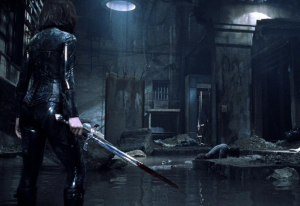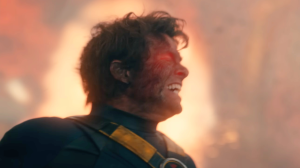Star Trek: Short Treks returns today with a new episode, “Ask Not.” The episode is the final installment of the show’s second season to focus on Capt. Christopher Pike’s Enterprise crew. It’s fitting then that it puts the spotlight on Capt. Pike himself. Anson Mount reprises his role as Pike, a role first played in the second season of Star Trek: Discovery. In an interview conducted over the phone, ComicBook.com spoke to Mount about what it was like returning to Pike for “Ask Not,” what a potential Pike spinoff might bring to the Star Trek franchise, and his behind-the-scenes friendships with his co-stars. SPOILERS for Star Trek: Short Treks, “Ask Not” follow.
Videos by ComicBook.com
In “Ask Not,” Capt. Pike appears to have been taken prisoner after being accused of mutiny by an admiral. He’s put in the custody of Starfleet Cadet Thira Sidhu (Amrit Kaur) on a Starbase while the admiral takes command of Enterprise. Pike struggles to convince Sidhu to disobey orders and free him. Sidhu refuses and even holds Pike at phaser-point before Pike reveals the entire “mutiny” to be a test of Sidhu’s loyalty and dedication. Having passed, Sidhu is set to join the engineering team aboard the Enterprise.
Here’s what Mount had to say about the episode in our conversation.

When you read the script for the short, what, if anything, did you see there that made you think, “Oh, here’s something I can do with this character that I didn’t get to do during season two of Discovery“?
Anson Mount: Well, let’s see. I guess that the thing that I liked about it, is that it … It’s funny to play a role, to begin with. And to be somebody else, you play make-believe for a living. But then to play somebody who’s playing a role with such high stakes, and then to have to figure out what is going on internally with Pike, rather than what he’s showing on the surface, immediately calls into question the relationship between his dedication to Starfleet and his humanity. It’s a fairly harsh thing that he’s putting this cadet through, but ultimately necessary. And so just from the acting perspective, I found that to be an interesting tightrope walk to try and create and walk. And yeah, I do believe that it explores the relationship between Pike’s dedication and Pike’s humanity.
He’s kind of the perfect character for that because he’s both a Starfleet idealist, but also puts his people above almost anything else. So, that was a really interesting, tense direction to go.
AM: Right. And you kind of have to … I mean, the obvious first question is, “How good of an actor is Pike?” In order to make the short work, you just have to go on faith that Pike is a very good actor.
How different was the filming experience for this compared to Discovery? Because Discovery is such a huge and kind of a bombastic show, and this was a very intimate thing, where you’re almost in one set with one actor for almost the entire thing.
AM: We’re shooting on the same sets that are redesigned to look like a starbase and we’re using the same crew. So really, it was a chance to get to go back and play in the sandbox with people who I really like. And it was very similar, in that sense.
But in terms of the bottling of the episode into that one room, I think that the building block of a good TV episode is the scene work. Each scene has to be its own little story. That’s the reason that I think that, far beyond his technical craft, Ridley Scott’s real talent, and you can see it in almost all of his movies, there is a story told in every single scene. Even if, on the page, it looks like it’s just a small plot service or connective tissue, there’s literally a story being told in every scene, almost every shot. I like digging down into each individual scene and figuring out what the nut of it is, and then seeing how we can broaden that for the sake of drama.
Considering what you just explained, I’m wondering if, looking back, there’s a particular scene from Discovery season two that stands out as your favorite, from the perspective of really getting to dig in and do something interesting.
AM: Well, just off the top of my head, yeah. That first scene on the bridge in episode one, when Pike introduces himself to the Discovery crew, is very well written. It lets us know who he is, right off the top, and what his skill sets are. I loved attacking that scene.
Also, and obviously in episode 12, “Through the Valley of Shadows,” in which Pike gets a glimpse of his future. It’s hard to call that a scene because we shot in so many different locations and across the span of like three weeks. It was shot very much in piecemeal, but we were really happy with how that came out.
And then the other thing that comes to mind, is getting to walk onto a set with Tig Notaro. Just getting to work with her was literally a joy, every time she was on the set. She was just obviously funny, but also a really good person.
Star Trek is kind of known for its technobabble, but I thought this episode was really interesting for its legal babble. I was wondering, how did that compare to what you had gotten used to? Is it kind of similar to learning all those weird technical terms or was it its own unique challenge
AM: It certainly wasn’t as difficult as the space gobbledygook, because the words are more familiar. There are a lot of words and terms and phrases in the space gobbledygook that just don’t exist. So, we don’t have any mental frame of reference for them. It’s the same difficulty you run into with a medical procedural, which I’ve done before as well. That’s why they have medical consultants on those shows so that they can explain to the actors what these things actually are. So that it makes sense to them and the scene will work.
We don’t have a 25th-century engineer to come and explain to us what is going on in the engine room. It’s funny. You kind of have to invent what some of this stuff is for yourself, in order to make it make sense. But no, I like the legal political battle in this episode, just because I’ve kind of always wanted to play — I played a lawyer before, a trial attorney. That was fun. But I’ve also kind of always wanted to play a political operative, and this episode is very, very political.
As far as we know, as far as what’s officially on the books, though I’m keeping my fingers crossed this isn’t the case, this is your last appearance as Pike. Assuming that remains the case, I was wondering how you feel about this short being that last appearance, especially considering what we know about Pike and his future after Enterprise, with Starfleet, training people and all of that.
AM: Well, it’s bittersweet, as coming to the end of a new job has ever been. I had an amazingly good time with that crew and cast and that world. I mean, I grew up a Trekker. It’s in my blood. It never occurred to me that I would ever get asked to join that family, and I’m really glad that I did.
In terms of possibly ending on this particular note, I think it would be quite … I don’t know if provenant is the word. I think it would be fitting, in the sense that what we did see and what we do know is that, that turning point in his future, he was injured because he’s trying to save cadets. He definitely has a fatherly energy about him, and he cares deeply for all who serve under him. So, I think it would be a fitting last note. Obviously, I’d love to do more.
Alex Kurtzman has talked about how he wants to make a lot of Star Trek shows, but that they all need to be unique, distinct. They can’t all be just more of the same thing. I was wondering if you’ve put any thought into, if there were a Pike spinoff, what the unique flavor that hypothetical spinoff would bring to the franchise would be, that you couldn’t get from those other shows?
AM: Ah, that’s a good question. I read a couple of different drafts of the pilot of Discovery because I was in discussions with them to possibly play Lorca, and they very wisely hired Jason Isaacs. But every creative choice that they made for Discovery is absolutely what I would’ve done as well. My pace in television is usually serialized, rather than episodic or procedural. I don’t feel that we had seen enough Trek with longer storylines, with more connective tissue between episodes.
That said, I think that to do a retro Enterprise show, it almost wants to be episodic, big idea of the week kind of thing. Not that there can’t be character development. There was in the original. But yeah, it just feels to me like it would fit well into a more of an episodic structure, like the original and like The Next Generation.
Our last day in Portugal and who drops by to see us at the chestnut festival in Marvao but @RebeccaRomijn and @MrJerryOC!!! We had a great time but Jerry decided to stay behind, buy a castle villa, and learn the ancient art of chestnut farming. He will be missed. pic.twitter.com/ohDtoLWgkl
— Anson Mount (@ansonmount) November 10, 2019
You mentioned that you got to come back and work with people you like, people you enjoy, on this again. Just following you on social media, it’s clear that you’ve become close with some of your costars. I think you were vacationing with Rebecca Romjin and her husband, Jerry O’Connell, who’s also part of Star Trek now. Could you tell us a bit about what those relationships are like, and if it’s something that seems to be unique to Star Trek? Because there are so many Star Trek casts that have become legendary for their friendships behind the scenes, years after the shows go off the air, from The Original Series, Next Gen, and now it seems Discovery.
AM: It’s not difficult for that to happen on any show because you’re working such long hours, and then sometimes in very remote places. Invariably, when you’re a young actor, somebody will come along and they explain to you that the acting career is a bit like summer camp. You go to these far off places and have these amazing experiences with these people that you form very close bonds with. And at the end of it, everybody says they’re going to stay in touch, and then nobody does.
I do think it’s a bit different for Star Trek because it comes with an ethic that was established by Gene Roddenberry that is about service. It’s about progress. It’s about serving something higher than yourself. And I do think that that changes the game a little bit, in terms of the relationships that are playing out behind the scenes. I’ve definitely developed friendships that I’ll have forever, and I’m very grateful for that.
**********************************************
Star Trek: Short Treks, “Ask Not” is now streaming on CBS All Access. Star Trek: Discovery Season 2 is available to stream on CBS All Access. The season is also now available on Blu-ray and DVD.








